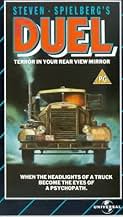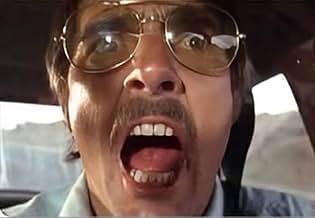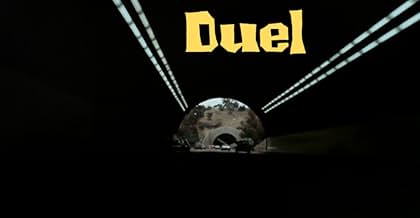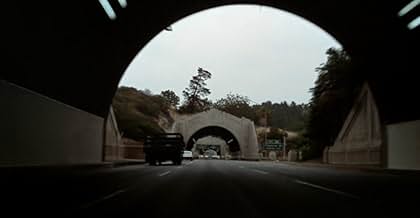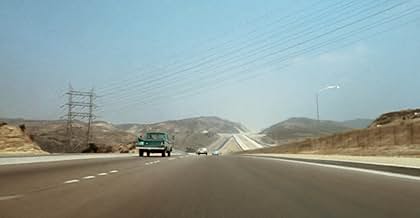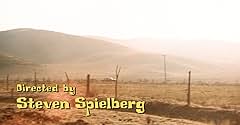Duel
- TV Movie
- 1971
- Tous publics
- 1h 30m
A business commuter is pursued and terrorized by the malevolent driver of a massive tractor-trailer.A business commuter is pursued and terrorized by the malevolent driver of a massive tractor-trailer.A business commuter is pursued and terrorized by the malevolent driver of a massive tractor-trailer.
- Won 1 Primetime Emmy
- 3 wins & 5 nominations total
Carey Loftin
- The Truck Driver
- (as Cary Loftin)
Dale Van Sickel
- Car Driver
- (as Dale VanSickle)
Lance Cormier
- Slow Man in Cafe
- (uncredited)
Chick Sheridan
- Old Man
- (uncredited)
Shawn Steinman
- Girl on school bus
- (uncredited)
Featured reviews
From the opening credits, where we see a POV of David Mann's car pulling out of his driveway off to who-knows-where, the viewer knows their in for something special. Indeed, Duel is something special. It's essentially a 90 minute chase with the occasional brief intermissions for scenery change. This could get old really quick, and indeed it does get old . . . but I can't help but watch in amazement and observe how long Spielberg kept me engaged in just two vehicles on open roads.
And interestingly enough, ten minutes after the film started boring me it recaptured my interest for the breathtaking finale.
After Duel, the Creeper truck and the semi from JoyRide are pushovers. This is the Freddy Krueger of vehicles, and the truck (not its driver) is treated as the bad guy. I particularly loved when the truck was shot in silhouette through the tunnel - beautiful and haunting composition. Also the shots where the camera pulls around Mann's car and travels parallel up along the truck simply put, 'awesome cinematography.' The high number of interesting shots (on location, no less) of the truck chasing Mann is what really drives this film forward. It takes a long time for this particular flair and flavor of film to get boring.
Dennis Weaver plays his part of David extremely well; unfortunately, I didn't much care for the spineless middle-class Joe-shmo character on the page. I think part of my dislike comes from those annoying internal monologues that were totally unnecessary. It's always been a cheap gimmick in my mind, and Weaver truly communicates those emotions without the added soundtrack. Still, despite a character that I did not like, Duel managed to keep me engaged in the story . . . strangely enough.
Earlier I spoke of brief intermissions from the chase; notice I didn't say the tension is eased up here. Spielberg finds ways to lace these breathers with suspense through the presence of the truck (still, more to do with the truck itself than the driver). And really, it's through these intermissions that we meet other (very colorful) characters who make quite an impact considering their bit parts (then again, maybe it's due to the fact that juxtaposed to an empty desert any character is colorful).
I appreciate the lack of any real information, lack of a motive, lack of background story on Mann, very little info (if any) on Mann's destination. I do, however, think Spielberg went just a bit too far with the ambiguity; however, that's a very minor complaint that I don't care to dwell on. Sure a few points needed to be touched on more, but then again the Freddy Krueger of diesel trucks is chasing you, are you really going to stop and ask it a question?
I wish the character emotions had taken the same route instead of feeding the audience those redundant internal monologues. Oh well, there's a fun contrast for you.
In my review of T3, I wrote 'I wonder what director will be the first to direct the very first film composed solely of one action scene?' Spielberg comes pretty damn close, and the funny thing is his 60+ minutes of chase footage is more interesting than the new millennium's 10+ minute chases. Rock on Steven!
And interestingly enough, ten minutes after the film started boring me it recaptured my interest for the breathtaking finale.
After Duel, the Creeper truck and the semi from JoyRide are pushovers. This is the Freddy Krueger of vehicles, and the truck (not its driver) is treated as the bad guy. I particularly loved when the truck was shot in silhouette through the tunnel - beautiful and haunting composition. Also the shots where the camera pulls around Mann's car and travels parallel up along the truck simply put, 'awesome cinematography.' The high number of interesting shots (on location, no less) of the truck chasing Mann is what really drives this film forward. It takes a long time for this particular flair and flavor of film to get boring.
Dennis Weaver plays his part of David extremely well; unfortunately, I didn't much care for the spineless middle-class Joe-shmo character on the page. I think part of my dislike comes from those annoying internal monologues that were totally unnecessary. It's always been a cheap gimmick in my mind, and Weaver truly communicates those emotions without the added soundtrack. Still, despite a character that I did not like, Duel managed to keep me engaged in the story . . . strangely enough.
Earlier I spoke of brief intermissions from the chase; notice I didn't say the tension is eased up here. Spielberg finds ways to lace these breathers with suspense through the presence of the truck (still, more to do with the truck itself than the driver). And really, it's through these intermissions that we meet other (very colorful) characters who make quite an impact considering their bit parts (then again, maybe it's due to the fact that juxtaposed to an empty desert any character is colorful).
I appreciate the lack of any real information, lack of a motive, lack of background story on Mann, very little info (if any) on Mann's destination. I do, however, think Spielberg went just a bit too far with the ambiguity; however, that's a very minor complaint that I don't care to dwell on. Sure a few points needed to be touched on more, but then again the Freddy Krueger of diesel trucks is chasing you, are you really going to stop and ask it a question?
I wish the character emotions had taken the same route instead of feeding the audience those redundant internal monologues. Oh well, there's a fun contrast for you.
In my review of T3, I wrote 'I wonder what director will be the first to direct the very first film composed solely of one action scene?' Spielberg comes pretty damn close, and the funny thing is his 60+ minutes of chase footage is more interesting than the new millennium's 10+ minute chases. Rock on Steven!
Leave it to prosemaster extraordinaire, Richard Matheson (a favorite of mine and the man Stephen King acknowledges as being his biggest influence), to come up a premise so simple yet so believable and terrifying that the viewer will never look at an eighteen-wheeler the same way ever again...and leave it to cinematic wunderkind, Stephen Spielburg, to do right by Matheson's script and win acclaim in the bargain.
Though some may argue that "Bullit", "Vanishing Point", or maybe even the original "Gone in 60 Seconds" could be called the ultimate car chase movie, "Duel" deserves this designation better because it does something none of the above films can claim. The story literally starts on the road and ends on the road. No location in the entire film is ever out of sight of the highway and, in spite of the brief conversation with the wife, virtually nothing else happens outside the highway. For David Mann (played adequately enough by Dennis Weaver) and the monster truck he's trying to get away from, the road and everything alongside it is their entire universe. Nothing else of importance exists outside of it.
Though it's never mentioned in the film, this would seem to take place on the California highways. When I went out there about eight years ago, I went down roads that seemed to be not too dissimiliar to the ones shown here. They seemed to stretch on forever, no vestiges of civilization in sight for miles. Spielburg uses this setting to great advantage. Being in your car in a crowded city intersection is one thing, but on those highways with nothing but your car and a homicidal maniac in a diesel for miles? The isolation factor that cars naturally produce jumps up a thousand percent. The radiator hose problem made me think of many other times that I had similar troubles with cars I've had. Of course, I never had someone trying to kill me at the time, but...
Anyone looking for drama, character development, or all the other elements that pseudo-critics point out as the mark of cinematic excellence are liable to be disappointed by "Duel". It's what King described in "Danse Macabre" as a Tale of the Hook. It's only purpose is to scare the hell out of you. Damn if it doesn't work. THAT'S the mark of a classic.
Though some may argue that "Bullit", "Vanishing Point", or maybe even the original "Gone in 60 Seconds" could be called the ultimate car chase movie, "Duel" deserves this designation better because it does something none of the above films can claim. The story literally starts on the road and ends on the road. No location in the entire film is ever out of sight of the highway and, in spite of the brief conversation with the wife, virtually nothing else happens outside the highway. For David Mann (played adequately enough by Dennis Weaver) and the monster truck he's trying to get away from, the road and everything alongside it is their entire universe. Nothing else of importance exists outside of it.
Though it's never mentioned in the film, this would seem to take place on the California highways. When I went out there about eight years ago, I went down roads that seemed to be not too dissimiliar to the ones shown here. They seemed to stretch on forever, no vestiges of civilization in sight for miles. Spielburg uses this setting to great advantage. Being in your car in a crowded city intersection is one thing, but on those highways with nothing but your car and a homicidal maniac in a diesel for miles? The isolation factor that cars naturally produce jumps up a thousand percent. The radiator hose problem made me think of many other times that I had similar troubles with cars I've had. Of course, I never had someone trying to kill me at the time, but...
Anyone looking for drama, character development, or all the other elements that pseudo-critics point out as the mark of cinematic excellence are liable to be disappointed by "Duel". It's what King described in "Danse Macabre" as a Tale of the Hook. It's only purpose is to scare the hell out of you. Damn if it doesn't work. THAT'S the mark of a classic.
I can recall vividly watching this movie as an ABC movie of the week at the tender age of six.Very few movies at that time in my life had the ability to captivate me.Duel was one of the fortunate few.We have a mild mannered businessman,excellently played by Dennis Weaver,on his way to a very important appointment.Suddenly,there is trouble ahead in the form of a ruthless tanker truck driver.For unexplained reasons,the truck driver singles out David Mann(Weaver)as the recipient of whatever rage and torment possesses him.Along the way,we have an apparently unsympathetic diner crowd,among whom this mad truck driver may have mixed in with while David was freshening up in the diner's restroom.Which one of them is it?Did he ever come in at all?Did he just linger outside,adding to David's torment?Then,there is the lady at the Snakerama,whose reptile displays are leveled when the truck driver realizes that David is trying to notify police in her phone booth.David ends up searching for strength he's not sure he possesses in order to combat this unseen menace.I love the idea of the driver never being seen,as the unseen is often more frightening than what is thrown in our face.This film may have been made for television,but it played like something you would see in a movie theater.I understand that it was in fact,released in theaters in England later on after Spielberg added some more footage.I am envious that they got to see this Hitchcock like thriller on the big screen.I consider it a grand edition to my DVD library.Great stuff.
2/28/2006 R.I.P. Dennis Weaver (1924-2006)
2/28/2006 R.I.P. Dennis Weaver (1924-2006)
This film proves that television can produce a quality film. Much like Spielberg's first big theatrical hit, "Jaws", this film deals with a menace, the driver, that is pretty much unseen for most of the film. It also preys upon our fear of being caught in a desperate situation with no one around to help. Also, Dennis Weaver was perfectly cast as the unfortunate motorist that happens to be the prey of a psychotic truck driver. This definitely is a far cry from Weaver's most famous role of Marshall Sam McCloud, who was the typical hero compared to the terrified motorist he plays in this film. Too bad that we here in the United States never got a chance to see this great film in a theater like the rest of the world. This is definitely a classic suspense film.
DUEL is Spielberg's JAWS of the highway, a raucous nascar race of a film that was "made for TV". Usually, the phrase made-for-TV makes me ill, but Universal TV executives had no clue what they had here. It was so good, the film got its fitting recognition in Europe, where it was released theatrically. Spielberg's own idol, director David Lean, praised the film's suspense and excitement. A testimonial from Sir David Lean is enough to get any career going. DUEL begins from the point of view of a driver, and never lets up. The fear Dennis Weaver encounters consists not only of the monster truck itself, which is on an unexpected death chase, but of the inability to see who (or what) is behind the wheel.
It seemed like a great episode of THE TWILIGHT ZONE, and Rod Serling would've been proud. Speed kills and you may never pass a slow truck on the highway again after seeing this. There is no character development, no humor, no identifiable characters, but in this case, who cares? It is only 90 minutes long and Spielberg's goal is to make you tired. To make you experience what this everyday salesman is going through for NO apparent reason. Besides a shark in the ocean, I really can't think of another more frightful situation to be in.
The truck itself is sinister looking, almost resembling one from RAIDERS OF THE LOST ARK. The only remnant of a human being in the truck is an arm. The arm waves much like the hitch-hiker in the famous TWILIGHT ZONE episode. Weaver is cheesy and silly looking in his Peter Fonda-esque shades, but it is a sign of the times. You don't necessarily find yourself rooting for him to escape alive. Basically, you are held prisoner by Spielberg's web of suspense, and stay wide-eyed the entire time. Great fun to watch on big or small screen.
RATING: 8 of 10
It seemed like a great episode of THE TWILIGHT ZONE, and Rod Serling would've been proud. Speed kills and you may never pass a slow truck on the highway again after seeing this. There is no character development, no humor, no identifiable characters, but in this case, who cares? It is only 90 minutes long and Spielberg's goal is to make you tired. To make you experience what this everyday salesman is going through for NO apparent reason. Besides a shark in the ocean, I really can't think of another more frightful situation to be in.
The truck itself is sinister looking, almost resembling one from RAIDERS OF THE LOST ARK. The only remnant of a human being in the truck is an arm. The arm waves much like the hitch-hiker in the famous TWILIGHT ZONE episode. Weaver is cheesy and silly looking in his Peter Fonda-esque shades, but it is a sign of the times. You don't necessarily find yourself rooting for him to escape alive. Basically, you are held prisoner by Spielberg's web of suspense, and stay wide-eyed the entire time. Great fun to watch on big or small screen.
RATING: 8 of 10
Did you know
- TriviaAccording to Richard Matheson, he was inspired to write the original short story "Duel" after an encounter with a tailgating truck driver on November 22, 1963, the day that John F. Kennedy was assassinated.
- GoofsWhen Mann approaches the phone booth at the "Snakerama" he says "Odd place for a telephone booth," and gets inside, closing the door behind him. The camera pans to the right slightly, revealing the reflection of Steven Spielberg in the lower right-hand side of the glass panel, wearing what appears to be a blue Hawaiian shirt, glancing up and down at the script in his hands. Behind him, the truck's reflection can also be seen.
- Quotes
David Mann: You can't beat me on the grade. You can't beat me on the grade!
- Crazy creditsA scene plays out over the credits where David Mann sits on the edge of the cliff throwing stones.
- Alternate versionsFor the German DVD release, the film was entirely redubbed.
- ConnectionsEdited into L'incroyable Hulk: Never Give a Trucker an Even Break (1978)
- SoundtracksBrush Those Tears from Your Eyes
(uncredited)
Written by Al Trace (as Clem Watts), Oakley Haldeman and James Lee
Published by MCA Music (ASCAP)
Details
Box office
- Budget
- $450,000 (estimated)
- Gross worldwide
- $2,544
- Runtime
- 1h 30m(90 min)
- Color
Contribute to this page
Suggest an edit or add missing content


